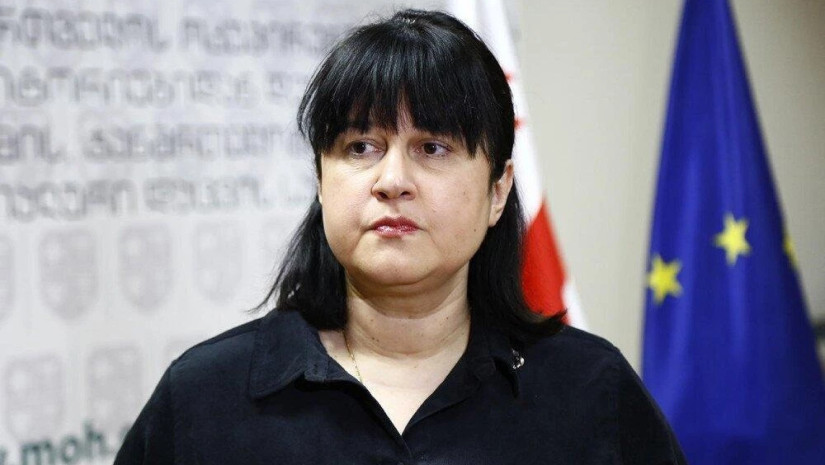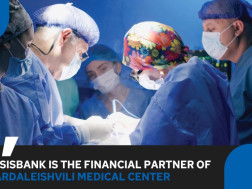International Foundation Curatio presented a new barometer study on the medical services market in Georgia – Structural Factors of the Medical Market and Its Implications was the main discussion point in late July with International Foundation Curatio presenting a new Health Care Barometer study – 15th wave of the research.
Barometer studies intend to emphasize challenges and opportunities for the healthcare system in Georgia. This time the main focus was on the structural factors of the medical market.
Deputy Minister Tamar Gabunia also attended the discussion. The Checkpoints crossed her for a brief interview.
What are some of the findings of the Barometer that could be translated into policy actions?
The Ministry has been actively following all the waves of the research that has been conducted by the International Foundation - Curatio within this health sector barometer project. Findings of today’s presentation, they are very much in line with the Ministry’s priorities.
So, the key issues identified by the research group were related to the weaknesses of the primary healthcare: This is one of the priorities outlined in the national health strategy, and we do intend to invest more in strengthening of the primary healthcare to make sure that the citizens of Georgia they can attend the primary care facilities when they experience health problems.
Other issues identified by this research were related to the excess hospital capacity which results in sometimes a low efficiency of the system because hospitals operate at 49% of utilization rate – that’s much lower than what we would desire for the efficient healthcare system.
Other findings were related how to strengthen the human resources for health: It’s well known that Georgia has high number of physicians as compared to nurses. Now we are very much keen to balance this ratio to make sure that we have more well trained and motivated nurses and again, these directions are articulated in the national health strategy.
A lot of emphasis was made on the need to have a well-developed national guidelines and protocols which are tools for improving clinical care. Again, this is another area where Ministry is working on. I would say that at this stage, a lot of emphasis was made on health financing – like payment mechanisms for hospitals within the universal healthcare program. Of course the government is committed to reach the universal health targets by 2030.
This is the program that we have started in 2013, and for all these years we have been working with all providers to make sure that tariffs are in line with their expenses; however, there are still concerns in relation to that and the Ministry is now redesigning the payment system into a DRG-based system which hopefully, will become operational by the end of this year – early, 2023. We’ve been working very actively with our partners from the WHO, as well as World Bank to design the DRG-model and have it fully operational within the few months.
Forbes Health has been covering these issues very closely. Large private sector – how does the Ministry view this structural factor in Georgia’s healthcare: Is it a bottleneck or is an opportunity cost-share the expenses of the universal healthcare?
Georgia’s healthcare sector is very much driven by private providers. We have 85% of hospital facilities privately owned and 15% of health facilities are owned by the state. We have a very good partnership established with private facilities and this partnership worked extremely well throughout COVID-pandemic when private providers provided substantial support and high level of services for patients with COVID.
We should consider that delivery in public health services is not a typical interest for private providers that’s why the state is interested in strengthening its own sector by building new premises for infectious disease hospital, for instance as well as few years ago we’ve established Georgian medical holding which is an umbrella agency now to manage public hospitals to strengthen them, to make sure that they also develop in line with market demands as well as population needs and they also provide their best possible care for Georgia’s citizens.
Of course, it’s very important to develop a fair pricing mechanism to make sure that private providers are still interested in delivering health services. This is why we have very intense consultations with the private sector and these days we’re working on the new payment mechanism which will be DRG based and more acceptable both for the state and for private providers.
But for the future we do understand that the country needs to develop the sustainable system for price-setting, negotiating with private providers. At this point, we’re thinking to establish this system which would be more long-term in terms of having a transparent, fair mechanism cost calculation as well as understanding population needs and designing the more efficient system. We understand the needs of the private providers and have state services planned to have balanced market drivers to have somehow consolidated approach to make system more patient centered and to avoid unnecessary costs.
These days we observe high number of services are developed on a private side for high tax services which might not be necessary at this stage: For instance, cardio surgery; neuro surgery or other high level services – this needs to be changed in the future. We plan to improve cooperation and planning with the private sector so we both better understand how to meet the needs of Georgia’s citizens.
So, basically you are saying that it is compatible to have two priorities at the same time – one being targeting low out-of-pocket payments and also maintaining the quality – is that right?
Yes. We all want the system to be more patient-centric. By saying that I mean that the quality should be guaranteed and patient should not need to pay much out of the pocket. These days we still observe that we have high out-of-pocket costs in the system. It has declined substantially since introduction of the universal healthcare program but it’s still high. So it is another priority to have better access on the pharma market to quality medicine which are affordable for patients.
Opening up the Turkish market was the step in that direction as I understand ...
Yes. Public-private partnership is not only about developing good private hospitals or building good public hospitals. It’s about balancing the service delivery model as well as providing adequate access to out-patient services, including out-patient drugs. So this is our priority to take a comprehensive approach and balance the needs. Also, to develop primary healthcare so that our system becomes more prevention oriented rather than to be cure oriented only.
Would you consider including private insurers as well into this process? The private insurance sector is not the same it used to be before – it has developed since then.
We are, of course, open to discuss the possibility for engagement of private insurance companies more actively in health related needs. This is another big area and we need more consultations and we really need to open the dialogue with all parties to explore what the possibilities can be.
















